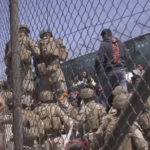Watchdog: US troop pullout was key factor in Afghan collapse
May 17, 2022, 8:14 AM | Updated: 8:58 pm

FILE - Taliban fighters stand guard at a checkpoint near the U..S embassy that was previously manned by American troops, in Kabul, Afghanistan, Aug. 17, 2021. A new report says decisions by Presidents Donald Trump and Joe Biden to pull all U.S. troops out of Afghanistan were the key factors in the collapse of that nation's military, leading to the Taliban takeover last year. (AP Photo, File)
(AP Photo, File)
WASHINGTON (AP) — A government watchdog says decisions by Presidents Donald Trump and Joe Biden to pull all U.S. troops out of Afghanistan were the key factors in the collapse of that nation’s military.
The new report by the Special Inspector General for Afghanistan Reconstruction, or SIGAR, mirrors assertions made by senior Pentagon and military leaders in the aftermath of the U.S. troop withdrawal that ended last August in the chaotic evacuation of Americans and other civilians from the embattled country. Military leaders have made it clear that their recommendation was to leave about 2,500 U.S. troops in the country, but that plan was not approved.
In February 2020, the Trump administration signed an agreement with the Taliban in Doha, Qatar, in which the U.S. promised to fully withdraw its troops by May 2021. The Taliban committed to several conditions, including stopping attacks on American and coalition forces. The stated objective was to promote a peace negotiation between the Taliban and the Afghan government, but that diplomatic effort never gained traction before Biden took office in January 2022.
Just a few months later, Biden announced he would complete the U.S. military withdrawal. The announcement fueled the Taliban’s campaign to retake the country, aided by the Afghans’ widespread distrust of their government and entrenched corruption that led to low pay, lack of food and poor living conditions among the Afghan troops.
“Many Afghans thought the U.S.-Taliban agreement was an act of bad faith and a signal that the U.S. was handing over Afghanistan to the enemy as it rushed to exit the country,” the interim report said. “Its immediate effect was a dramatic loss in (Afghan troops’) morale.”
U.S. officials have said they were surprised by the quick collapse of the military and the government, prompting sharp congressional criticism of the intelligence community for failing to foresee it.
At a congressional hearing last week, senators questioned whether there is a need to reform how intelligence agencies assess a foreign military’s will to fight. Lawmakers pointed to two key examples: U.S. intelligence believed that the Kabul government would hold on for months against the Taliban, and more recently believed that Ukraine’s forces would quickly fall to Russia’s invasion. Both were wrong.
Military and defense leaders have said that the Afghanistan collapse was built on years of missteps, as the U.S. struggled to find a successful way to train and equip Afghan forces.
In a blunt assessment of the war, Gen. Mark Milley, chairman of the Joint Chiefs of Staff, told Congress last fall that the result was years in the making.
“Outcomes in a war like this, an outcome that is a strategic failure — the enemy is in charge in Kabul, there’s no way else to describe that — that is a cumulative effect of 20 years,” Milley said, adding that lessons need to be learned, including whether the U.S. military made the Afghans overly dependent on American technology in a mistaken effort to make the Afghan army look like the American army.
Indeed, in the end, the new report said that the Afghans were still heavily dependent on U.S. air support for strikes and emergency evacuations, and also on U.S. contractors to maintain and repair aircraft and other systems.
But all agree that the Doha agreement was a lynchpin in the collapse.
“The signing of the Doha agreement had a really pernicious effect on the government of Afghanistan and on its military — psychological more than anything else, but we set a date-certain for when we were going to leave and when they could expect all assistance to end,” Gen. Frank McKenzie told Congress last year.
McKenzie, who was then the top U.S. general in the Middle East and has since retired, argued to keep 2,500 U.S. troops there, as did Milley.
The Doha agreement, said the SIGAR report, led the Afghan population and its military to feel abandoned. And the Trump administration’s decision to limit U.S. airstrikes against the Taliban stopped any progress the Afghans were making, and left them unable and eventually unwilling to hold territory, it said.
According to the report, a former U.S. commander in Afghanistan said the U.S. built the Afghan army to rely on contractor support. “Without it, it can’t function. Game over,” the commander told SIGAR. “When the contractors pulled out, it was like we pulled all the sticks out of the Jenga pile and expected it to stay up.”
More broadly, the SIGAR report said that both the U.S. and Afghan governments “lacked the political will to dedicate the time and resources necessary to reconstruct an entire security sector in a war-torn and impoverished country.”
Neither side, it said, “appeared to have the political commitment to doing what it would take to address the challenges.” As a result, it said, the Afghan military couldn’t operate independently and never really became a cohesive force.
Copyright © The Associated Press. All rights reserved. This material may not be published, broadcast, rewritten or redistributed.

















